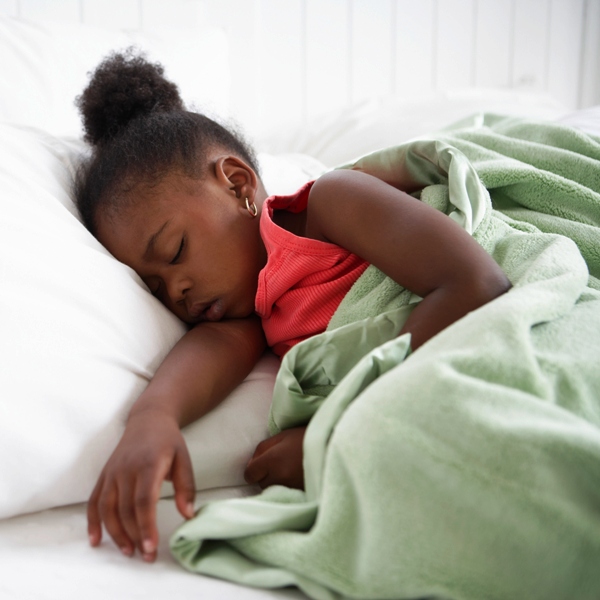 Sleep is not only important for your child’s rest and rejuvenation, good sleep is essential to healthy development. Sleep problems affect a child’s mood, ability to cope, and academic performance. Sufficient sleep can promote emotional resilience and keener senses.
Sleep is not only important for your child’s rest and rejuvenation, good sleep is essential to healthy development. Sleep problems affect a child’s mood, ability to cope, and academic performance. Sufficient sleep can promote emotional resilience and keener senses.
Quality vs. Quantity
Sleep scientists tell us that preschoolers need 11 to 13 hours of sleep each night, while children ages 5 to 12 need 10 to 11 hours. Making sure your child gets enough sleep can be a demanding task, but it’s one that reaps almost instant rewards. Well-rested children learn better, play better, and even sleep better the next night.
However, sleep is gauged by both quantity and quality. Scientists view our nightly slumber in terms of the stages of brain-wave activity and physiology that punctuate the course of a night’s sleep. These stages progress in predictable patterns known as sleep cycles. Sleep quality is a way of evaluating the health of our sleep cycles.
Sleep Cycle
A typical sleep cycle starts when your child feels drowsy, resulting in light sleep. Next, he or she enters a longer period of deep sleep, which is followed by a shorter period of rapid eye movement (REM) sleep. He or she dreams during REM sleep, and then the cycle begins again, starting with drowsiness or very light sleep. Your child will go through four to six (or more) sleep cycles during the night.
If his or her sleep is disturbed mid-cycle, and/or he or she has incomplete sleep cycles, or if he or she sleeps too lightly or wakes too easily, his or her sleep quality will be poor, independent of number of hours of sleep. This may lead to mood swings and/or difficulty with concentration, and over time, long-term health can be threatened.
Sleep Solutions
Here are five strategies that may help your child get the quantity and quality of sleep he or she needs:
1. Dim the lights.
Surprisingly, it’s not simply seeing light that wakes us in the morning. In fact, it is a specific wavelength of blue light that starts the process. Sunlight, as well as the light emitted by fluorescent bulbs, television, and computer and smart phone screens, contains blue wavelengths that trigger a waking response in our brains.
Exposing your child to these artificial light sources during the hour before bed can make falling asleep harder, and diminish the quality of sleep by curtailing the production of the sleep hormone melatonin. Even nonfluorescent lights can trigger this effect when the source is overhead, so avoiding the use of ceiling lights and tall floor lamps can help.
In place of watching nighttime TV and movies, have your child listen to stories. The tradition of reading bedtime stories out loud is perfect. If you are not in the mood to read, try an electronic book or gentle music.
For an older child who uses a computer or other electronics at night for homework, consider using an app or program that both dims screens at sunset and adjusts the output spectrum to include very little blue. The app will typically return the screen to its normal color mode and brightness at sunrise. The app described is shareware called f.lux.
2. Provide a calm environment.
A calming, soothing bedroom environment can be remarkably effective in helping your child fall asleep. To create a peaceful environment, reduce visual stimuli. If you are thinking of painting or redecorating, try using calm or soft colors. Set lamps on low bedside tables. Reducing clutter can help, too.
To provide a calm environment when siblings share a room, try a white-noise machine, or, if necessary, remove one child until the other can sleep well on his or her own.
If sleep is especially difficult to attain, stricter measures may be needed. Associating the bed with sleep can make a big difference and change how your child relates with his or her sleep environment. This entails pairing the bed with the activity of sleep, similar to how Ivan Pavlov paired a bell with meal time in his famous dog experiments.
Pairing the bed with sleep means that your child must use his or her bed only for sleeping—not to watch television in, eat in, or even play on. That way, whether he or she sees or lies in bed, his or her body will know the bed is meant for sleep. If sleep continues to be elusive, it may be time to seek the help of a licensed mental health or medical professional.
3. Establish a routine and stick with it.
A bedtime routine means consistently doing the same activities before bed, at or very close to the same time, every night. The activities can be as simple as teeth-brushing and pajama donning, as typical as a bedtime story, or as elaborate as a scented bath, followed by soothing music and a back massage. Whether simple or elaborate, a consistently applied routine will help your child have an easier time falling asleep and staying asleep.
A sleep routine also supports the circadian clock in your child’s brain. This is because over time your child’s brain associates the time of day and bedtime prep activities with sleep, so when the routine is started, the brain gears up for sleep while he or she completes the bedtime tasks.
One word of caution: a bedtime routine can be easier to establish than maintain. It helps if everyone in the household is on board. To set the stage for success, create a sleep schedule that can be consistently manageable, even if a parent is absent or the child is away from home.
An optimal routine starts the countdown between 30 and 60 minutes before bedtime. Timing is basic to routines, and while some flexibility is great, keeping bedtime at 9 p.m. or earlier is strongly recommended for children 12 and younger.
4. Substitute soda or hot chocolate with chamomile tea or warm milk.
What goes into your child’s body can impact how he or she sleeps, and understanding how different foods impact sleep can have life-long benefits.
Chamomile tea and warm milk each have ingredients that promote relaxation. Even if your child can fall asleep after drinking caffeine, his or her sleep cycles may not be as complete.
Teach your child to understand and respect his or her body. A healthy body supports healthy sleep. For example, he or she may need exercise during the day in order to sleep well at night.
Also, naps count. If your child still needs a nap, to have real value the nap must be at the right time. An optimal duration and time for napping is about 30 minutes between 2 p.m. and 5 p.m. Avoid napping between 7 a.m. and noon or after 6 p.m.
5. Teach your child how to self-soothe and relax.
Children get stressed too, and worries or tension can make it difficult to fall and stay asleep. In part, this is because stress is correlated with high cortisol levels, and high cortisol can inhibit sleep. However, when your child’s body moves into a relaxed state, cortisol levels reduce.
A healthy bedtime routine can reduce anxiety associated with sleep. Soothing and relaxation exercises don’t need to take a lot of time out of the routine. Adding just five to 10 minutes of a relaxing activity can make a difference. Relaxation techniques can include a muscle tension/relaxation exercise, a guided visualization, or listening to gentle music.
Massage and similar modalities can also help (for some children, a back rub is always welcome). Likewise, warm baths have long been believed to help induce asleep, and they’re a great part of the bedtime routine.
There’s another benefit to bedtime baths. They’re not only a way to keep your child clean and cozy, science has shown that a result of bathing is a drop in core body temperature, which helps to start the sleep cycle. An ideal bath time is first on the routine, at least an hour prior to sleep, so that your child’s body has time to cool down before he or she hits the sheets.
Research has demonstrated that a lavender scent can be effective at promoting relaxation, and thus works as a sleep aid. Try a drop of lavender essential oil in the bath water, or place a few on drops on the shower floor (scent will rise).
References:
- Abbott, S. M., Arnold, J. M., Chang, Q., Miao, H., Ota, N., Cecala, C., … Gillette, M. (2013, August). Signals from the Brainstem Sleep/Wake Centers Regulate Behavioral Timing via the Circadian Clock. PLoS ONE, 8(8), 1-11.
- BBC Worldwide Ltd. (2009). Films on Demand collection. 10 things you should know about sleep.
- Institute of Medicine (US) Committee on Sleep Medicine and Research; Colten HR, Altevogt BM, editors. Sleep Disorders and Sleep Deprivation: An Unmet Public Health Problem. Washington (DC): National Academies Press (US); 2006. 2, Sleep Physiology. RetrievedAugust 16, 2014, from: http://www.ncbi.nlm.nih.gov/books/NBK19956/
- Meltzer, L. (2010, Jul-Sep). Key procedural elements for the treatment of behavioral insomnia of childhood. Chart. Behavioral Sleep Medicine, 8(3), 177.
- Mindell, J. A., Meltzer, L. J., Carskadon, M. A., Chervin, R. D. (2009, August). Developmental Aspects of Sleep Hygiene: Findings from the 2004 National Sleep Foundation Sleep in America Poll. Sleep Medicine, 10(7), 771-779.
- National Sleep Foundation (2014). Children and Sleep. Retrieved August 13, 2014, from http://sleepfoundation.org/sleep-topics/children-and-sleep

The preceding article was solely written by the author named above. Any views and opinions expressed are not necessarily shared by GoodTherapy.org. Questions or concerns about the preceding article can be directed to the author or posted as a comment below.

 15 Secrets for a Good Night’s Sleep
15 Secrets for a Good Night’s Sleep When Trauma Follows You into Your Nightmares
When Trauma Follows You into Your Nightmares Are Separate Beds Always a Bad Thing?
Are Separate Beds Always a Bad Thing?

